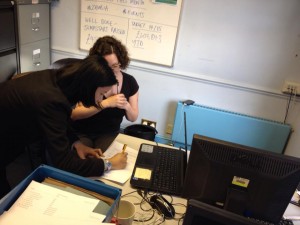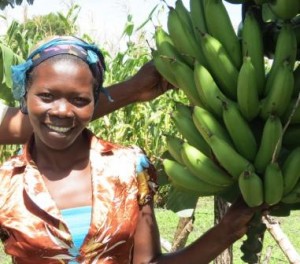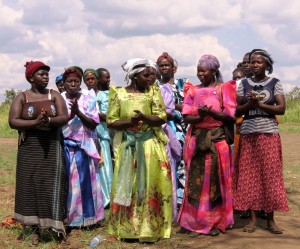Great news – Bestseller Fund to fund 3 year project in Amuru
January 19, 2015 Last week we signed a partner agreement with the Bestseller Fund, based in Copenhagen, to run a Schools Demonstration Garden Project in 15 schools in Amuru District. The 3 year funding is given after Bestseller Project Manager Mette Müller Kristensen visited our Gulu office in July and saw our project in action in Nwoya district. We’re very excited to work with Bestseller Fund team Mette, Kristian, Martin and Stine on a project model we’re very proud of at African Revival.
Last week we signed a partner agreement with the Bestseller Fund, based in Copenhagen, to run a Schools Demonstration Garden Project in 15 schools in Amuru District. The 3 year funding is given after Bestseller Project Manager Mette Müller Kristensen visited our Gulu office in July and saw our project in action in Nwoya district. We’re very excited to work with Bestseller Fund team Mette, Kristian, Martin and Stine on a project model we’re very proud of at African Revival.
 This project ties education and livelihoods together, and is one of African Revival’s core areas of expertise. Our intervention seeks to address two interlinked issues – low quality education at a primary level and food insecurity compounded by poor agricultural productivity. The project creates stronger links between parents and schools leading to increased enrolment, attendance and academic attainment and children are also learning practical agricultural skills. Parents increase agricultural productivity both at the school garden and home gardens, both increasing food security and nutrition. African Revival also links farmers and markets to increase opportunities for income generation – making the project both sustainable and holistic.
This project ties education and livelihoods together, and is one of African Revival’s core areas of expertise. Our intervention seeks to address two interlinked issues – low quality education at a primary level and food insecurity compounded by poor agricultural productivity. The project creates stronger links between parents and schools leading to increased enrolment, attendance and academic attainment and children are also learning practical agricultural skills. Parents increase agricultural productivity both at the school garden and home gardens, both increasing food security and nutrition. African Revival also links farmers and markets to increase opportunities for income generation – making the project both sustainable and holistic.
How does it work?
 Initially, our field officers would work with the District Education Officer to identify and select schools to implement the project within. Once the schools have been selected, the Head Teacher, the School Management Committee (SMC) and community members would be involved in selecting a site for the garden in the school grounds. Working with these stakeholders the field staff would then choose appropriate crops for each group, followed by preparation of the land and training on cultivation.
Initially, our field officers would work with the District Education Officer to identify and select schools to implement the project within. Once the schools have been selected, the Head Teacher, the School Management Committee (SMC) and community members would be involved in selecting a site for the garden in the school grounds. Working with these stakeholders the field staff would then choose appropriate crops for each group, followed by preparation of the land and training on cultivation.
At all school locations, African Revival works with the community to create farmer groups comprising of 25-30 members who will work with the school on the demonstration garden, attend weekly meetings and receive practical trainings by African Revival field staff. In addition to the above, African Revival also aims to secure gender balance within the farmer groups and working closely with the District Education Officer to select suitable schools for this project.
 After the first harvest (two per year), the groups will then distribute their profits from the yields – with linkages to local suppliers provided by African Revival. Typically, 30% is given back to the school where the school, the Parent Teacher Association (PTA) and SMC decide how it will be spent. Previously, they have used it to provide school meals, buy scholastic materials, constructing structures like latrines and buying solar panels; another 30% is kept as group development fund and the remaining 40% is shared among group members.
After the first harvest (two per year), the groups will then distribute their profits from the yields – with linkages to local suppliers provided by African Revival. Typically, 30% is given back to the school where the school, the Parent Teacher Association (PTA) and SMC decide how it will be spent. Previously, they have used it to provide school meals, buy scholastic materials, constructing structures like latrines and buying solar panels; another 30% is kept as group development fund and the remaining 40% is shared among group members.
The model uses the primary school as a learning site but the goal is to ensure that the agricultural skills from the school demonstration gardens is also utilised by the farmers at their homesteads. To achieve this, the initial group of up to 30 members in Year 3 will be split into two clusters, who in turn will impart their knowledge within their individual villages. Year 3 has a focus on sustaining the impact by ensuring that individual farmers are now fully utilising the new skills in agriculture.
